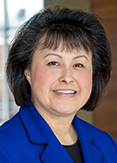Yvette Roubideaux, MD, MPH is a physician, researcher, and public health advocate. She is an enrolled member of the Rosebud Sioux Tribe and is descended from the Standing Rock Sioux Tribe. She is an Adjunct Professor in the Department of Health Systems, Management, and Policy at the Colorado School of Public Health.
Dr. Roubideaux previously served as the Director of the Policy Research Center at the National Congress of American Indians (NCAI) where she conducted and translated policy research and data to improve outcomes for American Indian and Alaska Native (AI/AN) Tribal Nations. Her work at NCAI included the quality of census data, Native vote data, data disaggregation, COVID-19 data trends, research on diabetes in AI/ANs, and education on tribal governance of research and strengthening tribal-academic research partnerships.
Her prior work included research, education, leadership, and policy development in the areas of AI/AN health and the quality of diabetes care. She served in the Obama Administration as a Senior Advisor to the HHS Secretary for American Indians and Alaska Natives and as the Director of the Indian Health Service (IHS). Dr. Roubideaux’s previous academic appointments include Clinical Professor and Associate Dean for Diversity, Inclusion, and Leadership at the Elson S. Floyd College of Medicine at Washington State University and Assistant Professor at the University of Arizona College of Medicine and Zuckerman College of Public Health. She served as the co-director of the Coordinating Center for the IHS Special Diabetes Program for Indians Diabetes and Cardiovascular Disease Prevention Demonstration Projects, directed training programs to encourage AI/AN students to enter health and research professions, is a founder of the Native Research Network, Inc., served as President of the Association of American Indian Physicians, and is an elected member of the National Academy of Medicine.
Dr Roubideaux received her undergraduate, medical and public health degrees at Harvard, authored several peer-reviewed research publications, and co-edited the 2001 book Promises to Keep: Public Health Policy for American Indians and Alaska Natives.



The Commonwealth Fundy Fellowship in Health Policy Leadership at Harvard University was a life-changing experience for me. The fellowship provided the opportunity to gain training in both public health and health policy in a supportive and encouraging environment. Prior to the fellowship, I was aware that I wanted to do more to improve the quality of healthcare for American Indians and Alaska Natives but I was unsure of the most effective way to accomplish this in my career. I worked as a clinician and medical director in the Indian Health Service, but I felt that the problems facing this population and its healthcare were much greater than what I was seeing on a day to day basis in the clinic.
My experiences caring for Indian patients revealed the persistent health disparities in this population and the impact of the significant underfunding and understaffing of the system, but I could not understand how these problems could be addressed in a more effective manner. During the fellowship, I learned about the various approaches to public health issues that worked in other communities, and the various resources available to meet these healthcare needs. I also was able to understand some of the reasons for the state of the Indian health system as I learned about national healthcare issues and challenges and similar problems in other underserved settings. The fellowship provided me with a framework from the policy perspective that helped me understand the various ways that the problems in Indian health could be addressed. I learned about the important role of data and research in helping inform policy decisions, and realized that one of the problems in Indian health is a lack of data and information on the causes of the health disparities and on potentially effective solutions. The fellowship was instrumental in helping me transition my career to an academic setting where I now work on research to measure the quality of healthcare for American Indians and Alaska Natives with diabetes, and I am involved in both policy and programmatic efforts to develop programs and educational efforts to help improve diabetes care and reduce health disparities in this population. I am grateful for the opportunity to learn and grow during the fellowship year and attribute my current and future successes to the support and encouragement I continue to receive in the growing network of past and present fellows. The fellowship has certainly enriched my life and my career, and it serves as a source of strength and encouragement for my current and future efforts to help improve healthcare for American Indians and Alaska Natives.